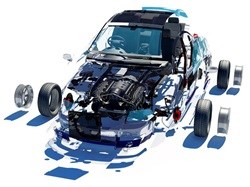
"I am certainly in favour of anything that makes our roads safer; however, if a modification is done safely and within guidelines, and if the vehicle has passed a roadworthy test, I see no reason to victimise the owners of modified vehicles," says Jeff Osborne, head of Gumtree Automotive.
"Cars are more than a mode of transportation. Many enthusiasts enjoy modifying or restoring cars as a hobby and there is a booming aftermarket industry as a result. Some individuals modify their cars for professional racing and rarely drive them on the open road except when en route to the track."
Any modification, including larger exhausts or fittings not specified by the car's manufacturer or not completed by an individual with a letter of authority by aforementioned manufacturer, may lead to the vehicle being declared unroadworthy, according to city officials.
Osborne says that the city may very well be making scapegoats of the owners of modified vehicles in order to clamp down on street racing.
"Illegal racing is a big concern and many modifications - including lowering of vehicles - are associated with the activity. However, modification and racing do not always go together.
"A distinction should be drawn between responsible and irresponsible modifications. There are many ill-maintained cars on the road made up of only original parts that are neither roadworthy nor safe at all, and the opposite could be said of certain modified cars. In fact, in some cases modifications improve the vehicle by introducing stronger or uprated parts, reducing fuel consumption or shortening braking distance."
There are a few safety guidelines and regulations that must be adhered to before tinkering with your cars' engine. "It is important to use quality parts from a reputable manufacturer," says Osborne. "It's not uncommon to cars that have stood on cinder blocks in someone's back yard for months being broken up for parts, but bear in mind that those parts have been exposed to the elements and may become hazardous."
In addition, new and overhauled engines have to be legally obtained. "All engines and chassis must have VIN numbers or other forms of identification - do not purchase any part that cannot be identified."
Similarly, if you are planning on fitting a custom body kit to your car (even one that you've made yourself) it must be done by a licensed professional. "Loose parts are particularly dangerous and it is important to adhere to guidelines in terms of specifications."
Osborne says there are several dangerous but common modifications spotted on the roads, including: